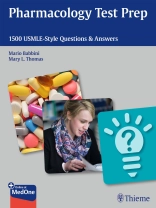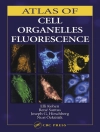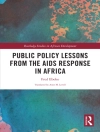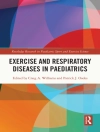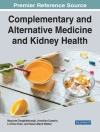A high-yield Q&A pharmacology review…
Pharmacology Test Prep is an outstanding collection of 1500 clinical multiple-choice questions written according to USMLE® guidelines and classified by learning objective and difficulty. The questions and answers in this book cover all the areas that are included in topic-based and organ system-based courses in the first two years of medical school. This book provides medical students preparing to take the USMLE® with a thorough review of pharmacology concepts and is an excellent review book for those needing to brush up on pharmacology for their rotations.
Key Features:
- Questions require students to analyze information before choosing the best answer
- Full explanations are included with answers, giving students a comprehensive USMLE® review tool
- Organized along clinical as well as pharmacological lines, making it suitable for both Step 1 and Step 2 exam preparation
Spis treści
Section I: General Principles of Pharmacology
Questions
I-1 Pharmacokinetics
I-2 Pharmacodynamics
I-3 Adverse Effects of Drugs
Answers and Explanations
Section II: Autonomic Nervous System
Questions
II-1 Introduction to Autonomic Pharmacology
II-2 Adrenergic Drugs
II-3 Antiadrenergic Drugs
II-4 Cholinergic Drugs
II-5 Anticholinergic Drugs
Answers and Explanations
Section III: Central Nervous System
Questions
III-1 Introduction to Central Nervous System Pharmacology
III-2 Sedative and Hypnotic Drugs
III-3 General Anesthetics
III-4 Local Anesthetics
III-5 Skeletal Muscle Relaxants
III-6 Antiseizure Drugs
III-7 Drugs for Degenerative Disorders of the Central Nervous System
III-8 Neuroleptic Drugs
III-9 Drugs for Depressive and Anxiety Disorders
III-10 Drugs for Bipolar Disorders
III-11 Drugs for Childhood Behavioral Disorders
III-12 Opioid Analgesics and Antagonists
III-13 Drugs of Abuse
Answers and Explanations
Section IV: Cardiovascular and Renal Systems
Questions
IV-1 Diuretics
IV-2 Drugs for Ischemic Heart Disease
IV-3 Drugs for Cardiac Failure
IV-4 Antihypertensive Drugs
IV-5 Antiarrhythmic Drugs
IV-6 Antihyperlipidemic Drugs
IV-7 Drugs Affecting Hemostasis
Answers and Explanations
Section V: Endocrine System
Questions
V-1 Drugs for Hypothalamic and Pituitary Disorders
V-2 Drugs for Thyroid Disorders
V-3 Corticosteroids and Antagonists
V-4 Drugs for Gonadal Disorders
V-5 Drugs for Bone Homeostasis
V-6 Drugs for Diabetes Mellitus
Answers and Explanations
Section VI: Respiratory, Gastrointestinal, and Hematopoietic Systems
Questions
VI-1 Drugs for Bronchospastic Disorders
VI-2 Drugs for Gastrointestinal Disorders
VI-3 Drugs for Hematopoietic Disorders
Answers and Explanations
Section VII: Inflammation and Immunomodulation
Questions
VII-1 Histamine and Serotonin: Agonists and Antagonists
VII-2 Eicosanoids: Agonists, Antagonists, and Inhibitors
VII-3 Nonsteroidal Antiinflammatory Drugs
VII-4 Immunomodulating Drugs
VII-5 Drugs for Arthritis and Gout
Answers and Explanations
Section VIII: Chemotherapeutic Drugs
Questions
VIII-1 Bacterial Cell Wall Synthesis Inhibitors
VIII-2 Bacterial Protein Synthesis Inhibitors
VIII-3 Inhibitors of Bacterial Nucleic Acid Synthesis or Function
VIII-4 Antimycobacterial Drugs
VIII-5 Antifungal Drugs
VIII-6 Antiviral Drugs
VIII-7 Antiprotozoal Drugs
VIII-8 Anthelmintic Drugs
VIII-9 Antineoplastic Drugs
Answers and Explanations
